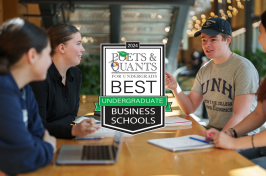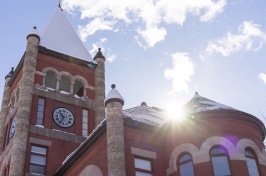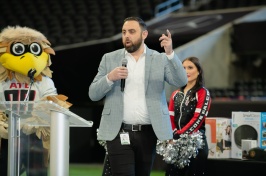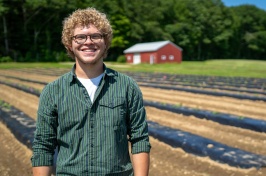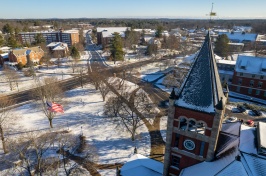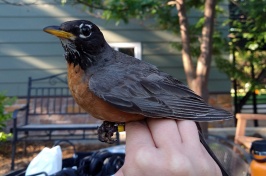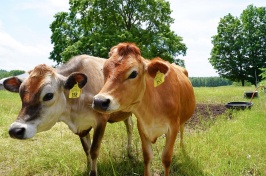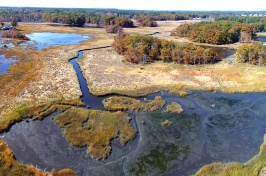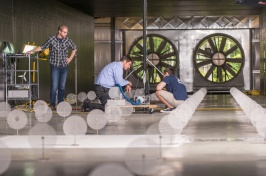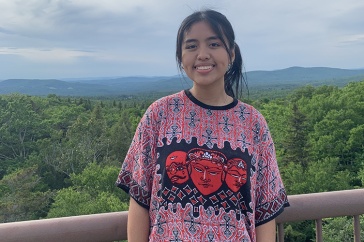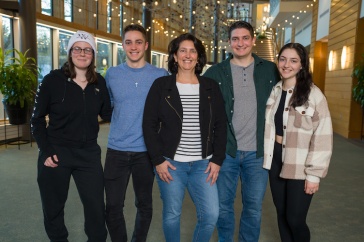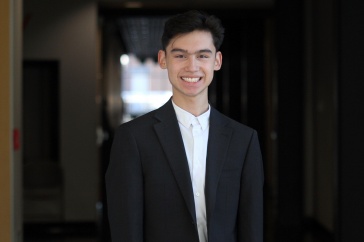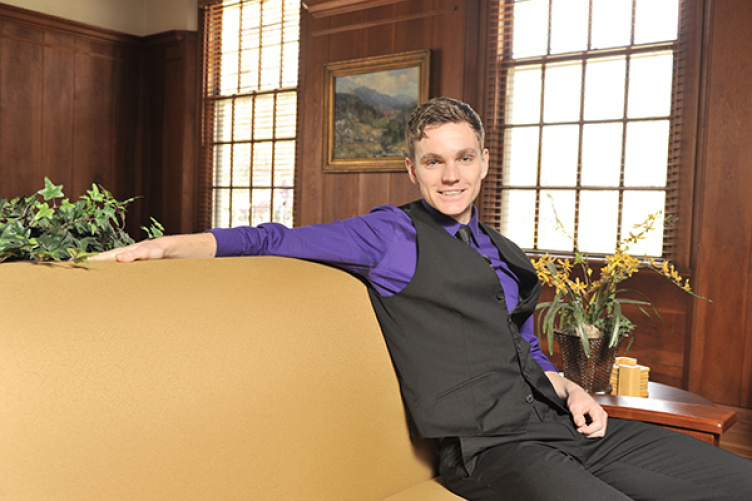
UNH graduate student Aliaksandr (Alex) Leuchanka came in 50th in the 2015 Boston Marathon.
It’s been a great month for Aliaksandr (Alex) Leuchanka. The graduate assistant in the department of kinesiology just learned that he has received the 2015 Basil J.F. Mott Award, which recognizes an outstanding graduate student in the UNH College of Health and Human Services, or CHHS. And late last week, he delivered the keynote address for the CHHS Grimes Award competition in fulfillment of receiving the award last year.
Needless to say, he’s had some success here. For that, he credits his older sister. “She set the bar high, and I’ve just been trying to keep up,” Leuchanka says.
Keeping up is not a problem for Leuchanka, who ran at the University of Albany for four years on a full athletic scholarship before coming to UNH for graduate school. This past week, Leuchanka was the 50th person to cross the finish line at the Boston Marathon.
Yes, that’s 50th — five zero — out of the nearly 30,000 souls who endeavored to run.
Leuchanka doesn’t make a big deal about it.
But he does admit to being a little bit surprised at just how well he finished, “mainly because we had such a strong headwind the whole way,” Leuchanka says. “That was probably the hardest part of the race.”
He ran with a pack of about 10 who took turns blocking the wind so others could draft. “"The beautiful thing about the marathon is there’s a lot of camaraderie." The top guys are really trying to beat each other up to win the race, but when you’re running a bit back, it’s like, everyone wants to run fast so we all kind of work together to run fast.” At one point, his pack caught up with one of the elite runners. “He tucked in behind our group and we saved him for a couple of miles,” Leuchanka says.
Leuchanka was born in Belarus and moved to the United States at age 9. Running is in his blood. His mother once held the Russian Federation record in 100K indoor road racing for nine years. That’s when you run 250 laps around a track one way, then 250 more in the other direction. His father competed in the Olympic Trials for the 1980 Summer Games. “He ran around 2:17 for the marathon, so I still have a little ways to go” to catch him, says Leuchanka, who finished Boston in 2:26.
He came to UNH to accept a graduate assistantship with Timothy Quinn, an associate professor in the department of kinesiology. He’d heard of Quinn through his sister Natallia Leuchanka '11, a UNH TIDES fellow, who had sent him an article about Quinn’s research on barefoot running. “I really like the whole minimalist idea of barefoot running — how it makes you run a little more naturally,” he says. Leuchanka didn’t have an exercise science background — at Albany he was pre-med — but he loved running and he had enjoyed working at a running shoe store during his undergraduate years. He applied to the graduate program.
“When I was first applying, I didn’t realize that you get an individual advisor, but I tailored my application towards Dr. Quinn’s research"When I was first applying, I didn’t realize that you get an individual advisor, but I tailored my application towards Dr. Quinn’s research.",” Leuchanka says. “It worked.” So he’s been working in the Robert Kertzer Exercise Physiology Laboratory at New Hampshire Hall for the past two years, leading the day-to-day activities of the lab and overseeing undergraduate students taking KIN 736 — Fitness and Graded Testing — while also conducting research and taking classes for his master’s degree.
“What we study, I basically get to put into practice,” Leuchanka says. “It’s the best way I can learn.”
Leuchanka’s research focuses on the effects of changing footwear on low leg muscle activation. “I’m measuring different levels of heel drop and how that affects runners. If you make the shoe flatter, how does that affect your muscle activation, specifically in the lower limb, as well as your running mechanics, your form?” Leuchanka says.
He’ll defend his thesis later this year, and he hopes to get a job in footwear research and development.
Quinn describes Leuchanka as “tireless” and someone whose work “is of the highest quality.”
Of his advisor, Leuchanka says, “I have learned everything from Dr. Quinn. I have learned the proper way to conduct research in all respects — from how to treat subjects to research methods.” Leuchanka adds with a grin and a quick glance toward his chest, “He’s even taught me the proper way to button a vest.”
Tell Us Your Thoughts
We asked Leuchanka, what are your thoughts on … Here’s what he said:
Thoughts on …
… running another marathon “I definitely want to do more. It’s my favorite distance. I like the marathon because sometimes it’s nice to go out there and run a 20-mile long run to just be outside and de-stress.”
… talking while running “You really have to be in talking mode, but just at that threshold. You should just be able to say a few words here or there but still keep running.”
… training “I run about 75 miles a week. Most marathoners will do a hundred or more. I get in what I can. I spend so much time here that I can’t really work out.
… the average runner “Honestly, I give so many more props to people who run 15-20 miles per week and then go out and run a marathon. The people who do that — they’re out there for a much longer period of time and that’s a much harder thing.”
… on moving from Belarus to Brooklyn “It was an interesting experience. I showed up to my fourth-grade classroom at Brooklyn PS 206 in a suit and got stared at. It took me about a year to master the English language. But, there’s a reason we moved. Life is a lot easier here. We’re very fortunate to have the opportunity to work hard and excel. That’s why my sister and I work really hard.”
The Basil J.F. Mott Award was established in 1989 in honor of Basil J.F. Mott, who served as dean of the UNH School of Health and Human Services between 1973 and 1989. The award recognizes the College of Health and Human Services graduate student who has demonstrated outstanding leadership, service and academic achievement.










